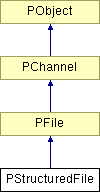
#include <sfile.h>
Inheritance diagram for PStructuredFile:

Structure definition functions | |
| enum | ElementType { Character, Integer16, Integer32, Integer64, Float32, Float64, Float80, NumElementTypes } |
| All element types in a structure. More... | |
| PINDEX | GetStructureSize () |
| void | SetStructure (Element *structure, PINDEX numElements) |
Public Member Functions | |
Structured I/O functions | |
| BOOL | Read (void *buffer) |
| BOOL | Write (const void *buffer) |
Protected Attributes | |
| PINDEX | structureSize |
| Number of bytes in structure. | |
| Element * | structure |
| Array of elements in the structure. | |
| PINDEX | numElements |
| Number of elements in the array. | |
Classes | |
| struct | Element |
| Elements in the structure definition. More... | |
This differs from object serialisation in that the access is always to a disk file and is random access. It would primarily be used for database type applications.
All element types in a structure.
| Character | Element is a single character. |
| Integer16 | Element is a 16 bit integer. |
| Integer32 | Element is a 32 bit integer. |
| Integer64 | Element is a 64 bit integer. |
| Float32 | Element is a 32 bit IEE floating point number. |
| Float64 | Element is a 64 bit IEE floating point number. |
| Float80 | Element is a 80 bit IEE floating point number. |
| NumElementTypes |
| PStructuredFile::PStructuredFile | ( | ) |
Create a structured file object but do not open it. It does not initially have a valid file name. However, an attempt to open the file using the PFile::Open()# function will generate a unique temporary file.
The initial structure size is one byte.
| PStructuredFile::PStructuredFile | ( | OpenMode | mode, | |
| int | opts = ModeDefault | |||
| ) |
Create a unique temporary file name, and open the file in the specified mode and using the specified options. Note that opening a new, unique, temporary file name in ReadOnly mode will always fail. This would only be usefull in a mode and options that will create the file.
The PChannel::IsOpen()# function may be used after object construction to determine if the file was successfully opened.
| mode | Mode in which to open the file. |
| opts | OpenOptions enum# for open operation. |
| PStructuredFile::PStructuredFile | ( | const PFilePath & | name, | |
| OpenMode | mode = ReadWrite, |
|||
| int | opts = ModeDefault | |||
| ) |
Create a structured file object with the specified name and open it in the specified mode and with the specified options.
The PChannel::IsOpen()# function may be used after object construction to determine if the file was successfully opened.
| name | Name of file to open. |
| mode | Mode in which to open the file. |
| opts | OpenOptions enum# for open operation. |
| PStructuredFile::PStructuredFile | ( | ) |
Create a structured file object but do not open it. It does not initially have a valid file name. However, an attempt to open the file using the PFile::Open()# function will generate a unique temporary file.
The initial structure size is one byte.
| PStructuredFile::PStructuredFile | ( | OpenMode | mode, | |
| int | opts = ModeDefault | |||
| ) |
Create a unique temporary file name, and open the file in the specified mode and using the specified options. Note that opening a new, unique, temporary file name in ReadOnly mode will always fail. This would only be usefull in a mode and options that will create the file.
The PChannel::IsOpen()# function may be used after object construction to determine if the file was successfully opened.
| mode | Mode in which to open the file. |
| opts | OpenOptions enum# for open operation. |
| PStructuredFile::PStructuredFile | ( | const PFilePath & | name, | |
| OpenMode | mode = ReadWrite, |
|||
| int | opts = ModeDefault | |||
| ) |
Create a structured file object with the specified name and open it in the specified mode and with the specified options.
The PChannel::IsOpen()# function may be used after object construction to determine if the file was successfully opened.
| name | Name of file to open. |
| mode | Mode in which to open the file. |
| opts | OpenOptions enum# for open operation. |
| BOOL PStructuredFile::Read | ( | void * | buffer | ) |
Read a sequence of bytes into the specified buffer, translating the structure according to the specification made in the SetStructure()# function.
| buffer | Pointer to structure to receive data. |
| BOOL PStructuredFile::Write | ( | const void * | buffer | ) |
Write a sequence of bytes into the specified buffer, translating the structure according to the specification made in the SetStructure()# function.
| buffer | Pointer to structure to write data from. |
| PINDEX PStructuredFile::GetStructureSize | ( | ) | [inline] |
Get the size of each structure in the file.
| void PStructuredFile::SetStructure | ( | Element * | structure, | |
| PINDEX | numElements | |||
| ) |
Set the structure of each record in the file.
| structure | Array of structure elements |
| numElements | Number of structure elements in structure. |
PINDEX PStructuredFile::structureSize [protected] |
Number of bytes in structure.
Element* PStructuredFile::structure [protected] |
Array of elements in the structure.
PINDEX PStructuredFile::numElements [protected] |
Number of elements in the array.
 1.5.1
1.5.1